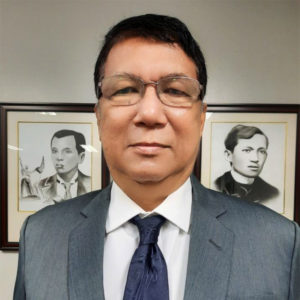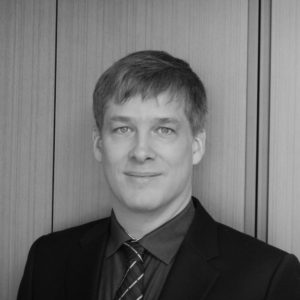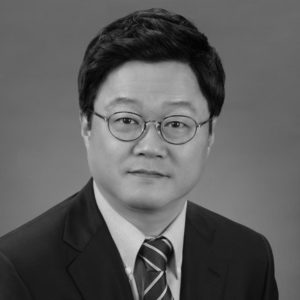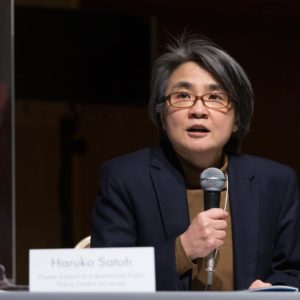
Thursday, October 7, 2021 16:00-17:30 (JST) Online
The dust from the shock of US withdrawal from Afghanistan has yet to settle but its ramifications are far-reaching. In Asia, the main theatre of US-China rivalry, questions about America’s role and mode of engagement in the region abound in the wake of Afghanistan. President Biden signaled the end of US involvement in “nation building of others”, but does this mean the “true end of Pax Americana”? This special roundtable discusses issues that have bearing on Northeast and Southeast Asia’s complex security environment, where both the traditional geopolitical security issues cross paths with the humanitarian-development-peace nexus policies.
Participation in this webinar is free of charge, but pre-registration is required.
“Post-Afghanistan America: Implications for Peace & Security in Asia” is an IAFOR Research Centre Roundtable organised in collaboration with PPSA Mindanao Caucus and in partnership with Mindanao State University, General Santos City, Philippines.
This event is organised as part of the IRC-OSIPP’s project on “Peace and Human Security in Asia: Toward a Meaningful Japan-Korea Partnership” supported by the Korea Foundation. It is also part of the OSIPP course, “Global Governance II”.
Speaker Profiles
Admiral Damian L. Carlos (Ret.)
Undersecretary for Counterterrorism, National Security Council of the Philippines, Philippines
 Admiral Damian L. Carlos (Ret.) is the Undersecretary for Counterterrorism at the Office of the President - National Security Council. He was a graduate of PMA Class of 1974 and he served as Philippine Liaison Officer to the RP-RI Border Committee in Manado, Indonesia. He was a platoon leader in the Philippine Marines and finished junior billets ashore and aboard ship. He had extensive experience in intelligence and Coast Guard operations. He is also a Command at Sea Badge Holder and has commanded different positions of responsibility in the Philippine Coast Guard. He retired as the Commandant of the PCG in 2007. After retirement from the uniformed service; he served as the Director, Harbour Star Shipping Services, Inc. (2009-31 May 2017) and as the General Manager, Harbour Tugboat Owners Association of the Philippines (HTAP) (2012-31 May 2017). During his service with the Coast Guard, he was awarded the following medals: Two (2) Philippine Legion of Honor with the rank of Datu and Maginoo, Twelve (12) Military Merit Medals, Distinguished Service Star, Command-at-Sea Badge, Distinguished Service Star, Outstanding Achievement Medals, Disaster Relief and Rehabilitation Medal, Anti-Dissidence Medal, Military-Civic Action Medal, Campaign Medals in Luzon, Visayas & Mindanao-Sulu.
Admiral Damian L. Carlos (Ret.) is the Undersecretary for Counterterrorism at the Office of the President - National Security Council. He was a graduate of PMA Class of 1974 and he served as Philippine Liaison Officer to the RP-RI Border Committee in Manado, Indonesia. He was a platoon leader in the Philippine Marines and finished junior billets ashore and aboard ship. He had extensive experience in intelligence and Coast Guard operations. He is also a Command at Sea Badge Holder and has commanded different positions of responsibility in the Philippine Coast Guard. He retired as the Commandant of the PCG in 2007. After retirement from the uniformed service; he served as the Director, Harbour Star Shipping Services, Inc. (2009-31 May 2017) and as the General Manager, Harbour Tugboat Owners Association of the Philippines (HTAP) (2012-31 May 2017). During his service with the Coast Guard, he was awarded the following medals: Two (2) Philippine Legion of Honor with the rank of Datu and Maginoo, Twelve (12) Military Merit Medals, Distinguished Service Star, Command-at-Sea Badge, Distinguished Service Star, Outstanding Achievement Medals, Disaster Relief and Rehabilitation Medal, Anti-Dissidence Medal, Military-Civic Action Medal, Campaign Medals in Luzon, Visayas & Mindanao-Sulu.
Brendan Howe
Dean, Graduate School of International Studies, Ewha Womans University, South Korea
 Brendan Howe is Professor of International Relations and former Associate Dean and Department Chair of the Graduate School of International Studies, Ewha Womans University. South Korea. He is also currently the President of the Asian Political and International Studies Association, and an Honorary Ambassador of Public Diplomacy and advisor for the Korean Ministry of Foreign Affairs. He has held visiting professorships and research fellowships at the Freie Universität Berlin, De La Salle University (Philippines), the University of Sydney, Korea National Defence University, the East-West Center (Honolulu), Georgetown University, Universiti Malaysia Sarawak, and Beijing Foreign Studies University.
Brendan Howe is Professor of International Relations and former Associate Dean and Department Chair of the Graduate School of International Studies, Ewha Womans University. South Korea. He is also currently the President of the Asian Political and International Studies Association, and an Honorary Ambassador of Public Diplomacy and advisor for the Korean Ministry of Foreign Affairs. He has held visiting professorships and research fellowships at the Freie Universität Berlin, De La Salle University (Philippines), the University of Sydney, Korea National Defence University, the East-West Center (Honolulu), Georgetown University, Universiti Malaysia Sarawak, and Beijing Foreign Studies University.
Educated at the University of Oxford, the University of Kent at Canterbury, Trinity College Dublin, and Georgetown University, his ongoing research agendas focus on traditional and non-traditional security in East Asia, human security, middle powers, public diplomacy, post-crisis development, comprehensive peacebuilding and conflict transformation. He has authored, co-authored, or edited more than 90 related publications including UN Governance: Peace and Human Security in Cambodia and Timor-Leste (Springer, 2020), Regional Cooperation for Peace and Development (Routledge, 2018), National Security, State Centricity, and Governance in East Asia (Springer, 2017), Peacekeeping and the Asia-Pacific (Brill, 2016), Democratic Governance in East Asia (Springer, 2015), Post-Conflict Development in East Asia (Ashgate, 2014), and The Protection and Promotion of Human Security in East Asia (Palgrave, 2013).
Bryce Wakefield
National Executive Director, Australian Institute of International Affairs, Australia
 From 2008 to 2012, Bryce was the associate responsible for Northeast Asian programs at the Woodrow Wilson International Center for Scholars in Washington, DC. In this role, he was responsible for conceiving, designing and organising around 60 events in Washington, including policy briefings in the U.S. Congress, on political issues in Australia, Taiwan, North and South Korea and Japan. From 2012 to 2018, he was a tenured lecturer of area studies and international relations at Leiden University in the Netherlands. Bryce’s academic publications to date focus on constitutional issues and defence policy, political marketing and national identity in Japan. While at the Wilson Center, he also edited and contributed to several of the centre’s multi-author publications on East Asian politics and foreign policy. Bryce lived in Japan from 1998 to 2004 and earned his master’s degree from Osaka University’s School of International Public Policy. He earned his PhD in political studies from the University of Auckland.
From 2008 to 2012, Bryce was the associate responsible for Northeast Asian programs at the Woodrow Wilson International Center for Scholars in Washington, DC. In this role, he was responsible for conceiving, designing and organising around 60 events in Washington, including policy briefings in the U.S. Congress, on political issues in Australia, Taiwan, North and South Korea and Japan. From 2012 to 2018, he was a tenured lecturer of area studies and international relations at Leiden University in the Netherlands. Bryce’s academic publications to date focus on constitutional issues and defence policy, political marketing and national identity in Japan. While at the Wilson Center, he also edited and contributed to several of the centre’s multi-author publications on East Asian politics and foreign policy. Bryce lived in Japan from 1998 to 2004 and earned his master’s degree from Osaka University’s School of International Public Policy. He earned his PhD in political studies from the University of Auckland.
Jaewoo Choo
Dept. of Chinese Studies, Kyung Hee University, South Korea
 Jaewoo Choo is Professor of Chinese foreign policy in the Department of Chinese Studies at Kyung Hee University, and Vice President of One Belt One Road Institute in Korea. He is a graduate of Wesleyan University (BA in Government) and Peking University (MA & PhD in International Relations). His research interests are Chinese foreign policy, multilateral security cooperation, US-China relations, and China-North Korea relations. Recent publications include US-China relations for Koreans: From Korean War to THAAD Conflicts (Seoul: Kyung-In Publishing House, 2017), US and China’s Strategy on the Korean Peninsula: Reading from the Facts (Seoul: Paper & Tree, 2018).
Jaewoo Choo is Professor of Chinese foreign policy in the Department of Chinese Studies at Kyung Hee University, and Vice President of One Belt One Road Institute in Korea. He is a graduate of Wesleyan University (BA in Government) and Peking University (MA & PhD in International Relations). His research interests are Chinese foreign policy, multilateral security cooperation, US-China relations, and China-North Korea relations. Recent publications include US-China relations for Koreans: From Korean War to THAAD Conflicts (Seoul: Kyung-In Publishing House, 2017), US and China’s Strategy on the Korean Peninsula: Reading from the Facts (Seoul: Paper & Tree, 2018).
Haruko Satoh
Co-Director, IAFOR Research Centre
Osaka School of International Public Policy (OSIPP), Osaka University, Japan
 Haruko Satoh is Co-Director of the IAFOR Research Centre set up with the International Academic Forum (IAFOR) at the Osaka School of International Public Policy (OSIPP), Osaka University, where she also teaches. At the IRC, she is responsible for coordinating research projects, such as “Korea and Japan in the Evolving China-US Relations (Korea Foundation) and a Japanese Ministry of Foreign Affairs project on preventing outbreaks of COVID-19 on cruise ships. She is also the editor of OpenAsia, the IRC blog. She previously ran the OSIPP student exchange project, “Peace and Human Security in Asia (PAHSA)” with six Southeast Asian. She has worked at the Japan Institute of International Affairs (JIIA), Chatham House, and Gaiko Forum. She has studied at Mount Holyoke College, Johns Hopkins University School of Advanced International Studies (SAIS) – Bologna Center, and University of Cambridge. Her interests are primarily in state theory, Japanese nationalism and identity politics. Recent publications include: “Great Power Relations and Threats to the Liberal International Order”, Hiroshima Peace Research Journal Vol. 8 March 2021; “Much Ado about a Constitution” in Lam Peng Er & Purnendra Jain (eds), "Japan’s Foreign Policy in the Twenty-First Century: Continuity and Change" (Lexington Book, 2020); and, “China in Japan’s Nation-state Identity” in Brown & Kingston (eds), "Japan’s Foreign Relations in Asia" (Routledge, 2018). She is member of the international advisory board of the Leiden AsiaCentre, the Executive Council of the Asian Political and International Studies Association (APISA) and the board of the International Academic Forum (IAFOR).
Haruko Satoh is Co-Director of the IAFOR Research Centre set up with the International Academic Forum (IAFOR) at the Osaka School of International Public Policy (OSIPP), Osaka University, where she also teaches. At the IRC, she is responsible for coordinating research projects, such as “Korea and Japan in the Evolving China-US Relations (Korea Foundation) and a Japanese Ministry of Foreign Affairs project on preventing outbreaks of COVID-19 on cruise ships. She is also the editor of OpenAsia, the IRC blog. She previously ran the OSIPP student exchange project, “Peace and Human Security in Asia (PAHSA)” with six Southeast Asian. She has worked at the Japan Institute of International Affairs (JIIA), Chatham House, and Gaiko Forum. She has studied at Mount Holyoke College, Johns Hopkins University School of Advanced International Studies (SAIS) – Bologna Center, and University of Cambridge. Her interests are primarily in state theory, Japanese nationalism and identity politics. Recent publications include: “Great Power Relations and Threats to the Liberal International Order”, Hiroshima Peace Research Journal Vol. 8 March 2021; “Much Ado about a Constitution” in Lam Peng Er & Purnendra Jain (eds), "Japan’s Foreign Policy in the Twenty-First Century: Continuity and Change" (Lexington Book, 2020); and, “China in Japan’s Nation-state Identity” in Brown & Kingston (eds), "Japan’s Foreign Relations in Asia" (Routledge, 2018). She is member of the international advisory board of the Leiden AsiaCentre, the Executive Council of the Asian Political and International Studies Association (APISA) and the board of the International Academic Forum (IAFOR).

